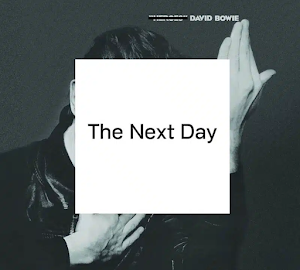My Month of Bowie, day 25: 'The Next Day' (2013)
 Surprise! Bowie's back! It took him a decade, but he's back!
Surprise! Bowie's back! It took him a decade, but he's back!The album: The Next Day (ISO, 2013)
 Welcome back... again.My thoughts: After a decade away from the limelight following his heart attack, David Bowie returned to the studio and reteamed with longtime producer Tony Visconti for 2013's The Next Day. And we'll talk all about that in a moment, I promise. But there's something else on my mind right now.
Welcome back... again.My thoughts: After a decade away from the limelight following his heart attack, David Bowie returned to the studio and reteamed with longtime producer Tony Visconti for 2013's The Next Day. And we'll talk all about that in a moment, I promise. But there's something else on my mind right now.All month long, I've been doing my level best to avoid biographical information about Bowie and his often-messy personal life. I figured, what this guy did when he was out of the recording studio (or offstage) was none of my business. Occasionally, just for the purposes of clarity, I've had to delve into the reasons why David made certain albums at various points in his life, e.g. the so-called Berlin trilogy (1977-1979) or Let's Dance (1983). But even then, I've tried to keep the focus on the music, not the man. This series is not meant to be a history of Bowie but rather a journal of my reactions to his albums.
Very recently, though, I watched an eye-opening 48-minute video by YouTuber and historian Jenny Draper entitled "How We Beat the Fascists Last Time," part of her ongoing series, The London History Show. It details how England was seized by anti-immigrant hysteria in the 1970s and how this led to a surge of quasi-Nazi hate groups, some of which started making political inroads and gaining surprisingly broad support. Draper even singles out a few celebrities who voiced disturbing, racist opinions back then, including David Bowie.
This wasn't totally out of left field. I'd heard that David made some "controversial" political statements in the mid-to-late-1970s, but I figured this had been done purely for shock value and to generate some press. Also, he was way into cocaine at that point and was slipping into Howard Hughes-level paranoia. But none of that really excuses his comments, certainly not his seeming endorsement of Hitler as "the first rock star." Besides, David's hateful statements sound eerily sincere, not the kind of thing you'd say casually in an attempt to be "provocative."
var infolinks_pid = 3415273; var infolinks_wsid = 0;
Published on September 25, 2025 03:00
No comments have been added yet.



